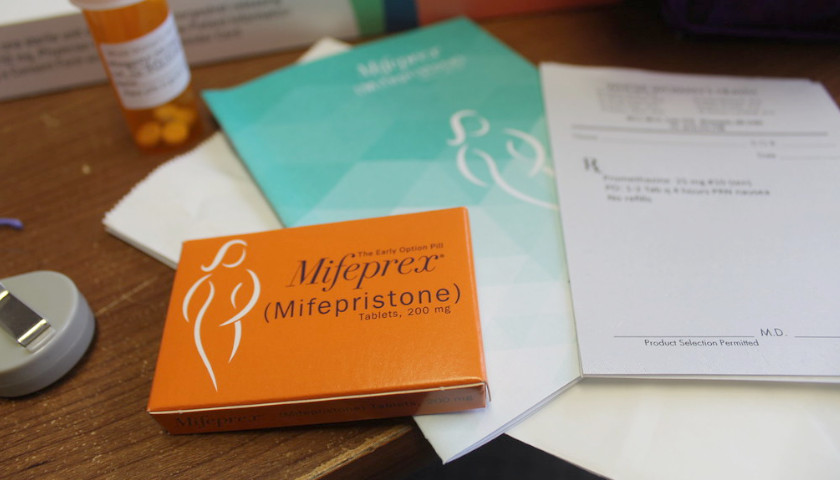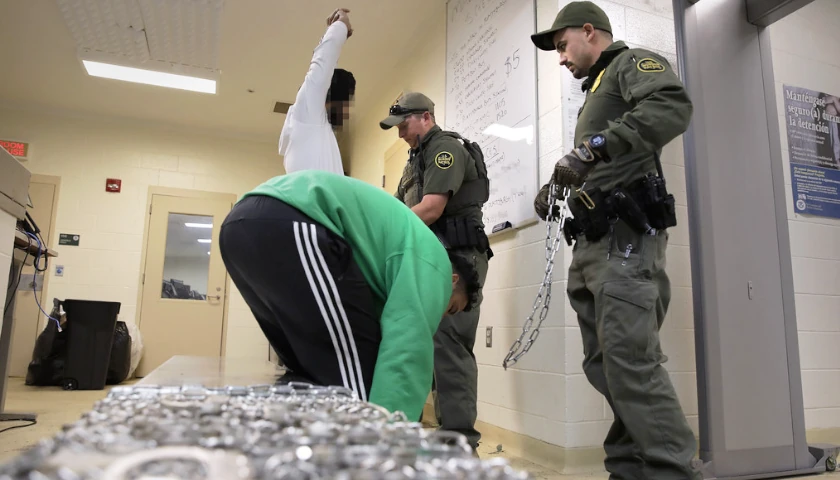The Food and Drug Administration (FDA) made a regulatory change that allows independent and chain drugstores, as well as mail-order companies, to offer a drug that induces abortion, making it easier for women and girls to conduct their own abortions at home or in college dorms.
The New York Times reported Tuesday evening the FDA’s regulatory change, which apparently came without an official announcement to the public, officially removes the requirement for the patient to have an in-person doctor’s visit for the prescription of mifepristone, the first drug used to induce an abortion.
According to the report:
Until now, mifepristone — the first pill used in the two-drug medication abortion regimen — could be dispensed only by a few mail-order pharmacies or by specially certified doctors or clinics. Under the new F.D.A. rules, patients will still need a prescription from a certified health care provider, but any pharmacy that agrees to accept those prescriptions and abide by certain other criteria can dispense the pills in its stores and by mail order.
Misoprostol, the second drug taken to induce an abortion, has historically been easily obtained at pharmacies through the normal prescription process.
With the requirement for an in-person doctor visit prior to a prescription for mifepristone now officially eliminated, two criteria remain to allow women and girls to simply have their prescription for the pills filled at chains such as CVS and Walgreens: healthcare providers must show they have the expertise and ability to treat abortion patients, and the patients must fill out a consent form.
The abortion industry claims that abortion pills are safe for women (they are, of course, never safe for the unborn children they target).
Yet peer-reviewed science and data say otherwise.
Get the facts about chemical abortion: https://t.co/Knft5yBzHv pic.twitter.com/UdIZWO90C2
— Charlotte Lozier Institute (@LozierInstitute) January 3, 2023
Drug companies Danco Laboratories and GenBioPro – both of which manufacture the pill – released press statements noting the FDA had informed them of the regulatory change.
Danco Laboratories, which sells the abortion drug under the brand name Mifeprex, said in a statement about the FDA’s move:
At a time when people across the country are struggling to obtain abortion care services this modification is critically important to expanding access to medication abortion services and will provide healthcare providers with an additional method for providing their patients with a safe and effective option for ending early pregnancy. Danco is proud and honored to continue the work with Mifeprex ® providers and the reproductive rights community that has spanned more than two decades.
Abortion industry giant Planned Parenthood celebrated the federal agency’s rule change.
Big news today! We applaud the FDA’s important step forward.
Eliminating medically unnecessary restrictions on medication abortion is critical for improving access.https://t.co/hCDftSg6fl
— Planned Parenthood (@PPFA) January 4, 2023
Abby Johnson, former Planned Parenthood director and founder of And Then There Were None, a ministry that helps abortion workers leave the industry, explained in comments to The Star News Network the abortion industry “loves anything that gives women more access to abortion because it means more money for them and that’s always been their bottom line.”
Johnson commented on the fact that the FDA’s elimination of restrictions on mifepristone means more at-home abortions, an outcome the abortion industry once assailed:
Women deserve so much better than abortion, than being told that at-home abortions are somehow safe and easy and just like a “heavy period.” That’s a complete lie – I had a medication abortion and no one told me how I thought I would be dying because of the pain and amount of blood I lost. The old coat hanger that used to represent back-alley abortions that Planned Parenthood loved to use should be brought back to remind women that they are going to be just as alone, and quite possibly in more pain and agony, as when they take the abortion pill.
Johnson said she had two abortions before her conversion to the pro-life movement, one of which was drug-induced.
“It was horrific,” she noted. “I was alone, in immense pain, and bleeding profusely.”
She elaborated on the dangers associated with drug-induced abortion:
It was this scene in the movie Unplanned that garnered it an R rating, and that scene was less bloody and painful than in real life. The thing is, it almost doesn’t even matter that the FDA is allowing the abortion pill to be more widely available because the women aren’t seeing a doctor either way. They aren’t having ultrasounds and some aren’t even verifying they are pregnant. The people dispensing the drugs have no idea how old these women are or their medical history.
“While the abortion lobby will say this move is a huge step forward for women, it’s only a step forward for them and for those who manufacture the abortion pills because it means more money for them while throwing women under the bus,” Johnson said. “They don’t care about the women who are ordering the pills or what will happen to them when they lie on their bathroom floors and think they are dying. That’s exactly what happened to me and it still haunts me to this day. No woman should have to go through that.”
In May, the Charlotte Lozier Institute (CLI), the research arm of Susan B. Anthony Pro-Life America, revealed increased health risks for women urged by abortion activists and providers to keep secret their drug-induced abortions if they require hospital admissions or surgeries for complications.
Learn more: https://t.co/89nLYYtdlx
— Charlotte Lozier Institute (@LozierInstitute) May 26, 2022
According to the CLI study, if a woman’s complications resulting from a drug-induced abortion are miscoded as a miscarriage in the ER, as advised by the abortion industry, she is more than twice as likely to need surgical admission and at significantly greater risk of multiple hospital admissions.
CLI reports the drug mifepristone works to “starv[e] the unborn baby of hormonal support.”
“When used as part of the abortion drug regimen, misoprostol induces contractions to expel the baby and placental tissue from the uterus,” the institute notes.
CLI also revealed in 2021 the dramatic spike in abortion pill-related emergency room visits.
James Studnicki, Sc.D., CLI’s vice president of data analytics and lead author of the abortion pill studies, asserted the abortion industry’s claims of the safety of chemical abortion is “greatly exaggerated”:
In fact, the increasing dominance of chemical abortion and its disproportionate contribution to emergency room morbidity is a serious public health threat, and the real-world data suggests that threat is growing.
“Our peer-reviewed research should alarm anyone who claims to be pro-woman, yet the current trend among pro-abortion politicians, bureaucrats, and their allies in the media is to turn a blind eye,” Studnicki said.
Texas-based Ingrid Skop, M.D., F.A.C.O.G., CLI’s director of medical affairs, also emphasized the dangers associated with drug-induced abortions.
“I’ve performed at least a dozen surgeries on women who experienced complications when the abortion pills failed,” Skop said. “I’ve cared for several women who took mifepristone and misoprostol and required blood transfusions or treatment for severe infections, and I’ve counseled women who experienced significant emotional distress after viewing the body of their easily identifiable child in the toilet.”
Skop noted as well in her area OB/GYNs “are regularly called upon to address serious abortion pill complications that Planned Parenthood fails to treat and which the FDA doesn’t even bother to track.”
“Right now, the abortion pill is promoted as safe under a ‘see no evil, hear no evil, report no data on evil’ regime that puts the life and health of women and girls at risk,” she asserted.
Students for Life of America President Kristan Hawkins explained drug-induced abortion is already ranking as the primary method of abortion. She added that cutting the requirement for an in-person doctor’s visit and allowing pharmacies to easily sell these drugs is a “win for the abortion lobby who profits off the death of the preborn and a loss for women who will suffer physically, mentally, and emotionally.”
Hawkins said the FDA’s move amounts to the Biden administration “making dangerous chemical abortion pills attainable at every corner as it lowers the medical standards for protecting women.”
“The objective of this administration has always been increased access to dangerous drugs which is why Students for Life has launched a multi-layered campaign to demand transparency and real tests into the impact of these pills on women and the environment,” she said.
– – –
Susan Berry, PhD is national education editor at The Star News Network. Email tips to [email protected].
Photo “Mifeprex” by Robin Marty. CC BY 2.0.






Is this legal in states that have abortion bans? I am distressed at the federal government’s involvement in something like this.
One would think that there would be more education in prevention of unwanted pregnancies. Instead of promoting the abortion pill why not birth control pills or did they never hear about condoms? Then there is always abstinence before marriage.